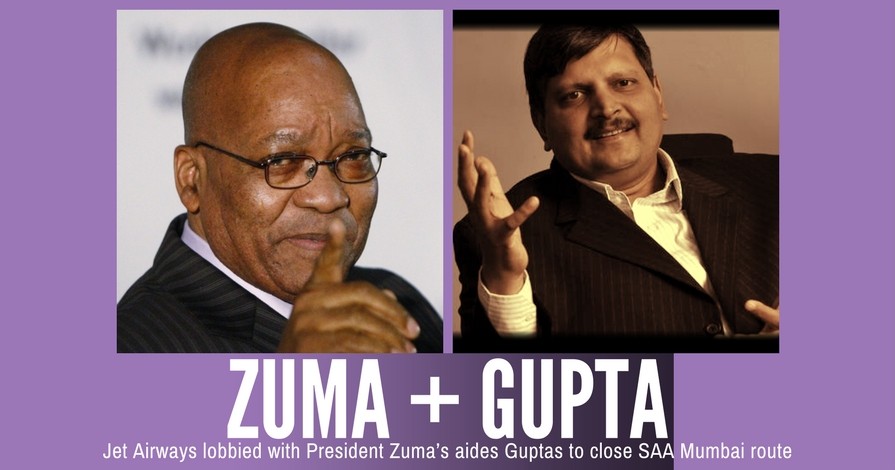Virendra Pandit
New Delhi: Jacob Zuma, former President of South Africa, became the first Head of the State in the country to be found guilty of contempt of court and sentenced to 15 months in prison.
The court found him guilty of defying a court order to appear before an inquiry probing wide-ranging allegations of corruption during his tenure from 2009 to 2018.
During this period, Zuma was close to India-born Gupta Brothers who allegedly fled the country after corruption charges surfaced.
On Tuesday, Zuma was absent when the court ruled and was directed to surrender before the police within five days in his hometown of Nkandla in KwaZulu-Natal province, or in Johannesburg.
South Africa’s apex court, the Constitutional Court, ruled that Zuma defied an order by refusing to cooperate with the Commission of Inquiry, chaired by Deputy Chief Justice Raymond Zondo.
“The Constitutional Court holds that there can be no doubt that Mr. Zuma is in contempt of court. Mr. Zuma was served with the order and it is impossible to conclude anything other than that he was unequivocally aware of what it required of him,” said Acting Chief Justice Sisi Khampepe”, media reported.
In determining the jail sentence for Zuma, she said, the court found it impossible to conclude that he would comply with any other order.
“Mr. Zuma has repeatedly reiterated that he would rather be imprisoned than to cooperate with the commission or comply with the order made,” said Justice Khampepe.
Earlier, Zuma had expressed his unwillingness to appear before the probe panel, which has so far heard evidence directly implicating Zuma in wrongdoing.
In a previous 21-page letter written to Chief Justice Mogoeng Mogoeng, which the court has described as “scandalous,” Zuma claimed that he was ready to be sent to prison, according to media reports.
In his letter, released to the public, Zuma claimed that the Commission Chairman, Zondo, was biased against him and that evidence presented against him was politically motivated.
Some former Cabinet ministers, high-ranking government officials, and executives of state-owned enterprises are among witnesses who have implicated Zuma in corruption.
Several have testified that while president Zuma allowed members of the controversial Gupta family to influence his appointment of Cabinet ministers and lucrative contracts at state-owned companies.
Zuma is also facing legal woes as he is standing trial to face charges related to bribes that he allegedly received during South Africa’s 1999 arms procurement deal.
He has pleaded not guilty to the charges and his lawyers have applied for the lead prosecutor in his case to step down because of alleged bias against Zuma.
Early in June, a South African court froze the assets of the Gupta family and their associate, Iqbal Meer Sharma, which included palatial homes in upmarket areas.
The Guptas, accused of siphoning billions of rand from state and parastatal institutions, are believed to be in self-exile in Dubai, with reports that some family members are in India.
In April 2021, South Africa’s central bank had seized over $1.3 million from a bank account of the now-abandoned Gupta-owned Sahara Computers, which was one of the country’s leading IT hardware suppliers.
Hailing from Saharanpur in Uttar Pradesh, the Gupta brothers—Ajay, Atul, Rajesh (Tony), and their cousin Varun—had a humble beginning. Their father Shivkumar Gupta was a soapstone powder distributor.
The Gupta Brothers reached South Africa in the early 1990s and expanded their chain of businesses there from a retail shoe store into a vast empire spanning information technology, mining, and media.
In 2016, Atul Gupta became the seventh-wealthiest person in South Africa, with an estimated net worth of R10.7 billion (US$773.47 million). Other brothers’ families also flourished. They had a finger in every pie in the country and were seen as the most powerful people in the country until Zuma ruled.
Then the wheel turned full circle. They were accused of promoting their business illegally with ‘support’ from the then South African President Jacob Zuma. Charged with corruption, banks refused loans or any other support, they had to sell their businesses and allegedly flee to Dubai.
South Africa’s Investigating Directorate (ID) of the National Prosecuting Authority (NPA) has urged Interpol to issue Red Notice (international arrest warrants) for Atul Gupta and Rajesh Gupta, and their wives Chetali and Arti.
South Africa has sent extradition papers to both India and the UAE, although it has no extradition treaty with the UAE.

